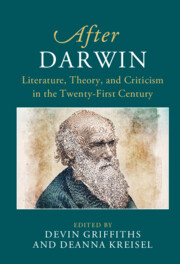Book contents
- After Darwin
- After Series
- After Darwin
- Copyright page
- Contents
- Figures
- Contributors
- Chapter 1 Introduction
- Part I Environments after Darwin
- Part II Differences after Darwin
- Part III Humanism after Darwin
- Chapter 11 Darwin’s Human History
- Chapter 12 Conscience after Darwin
- Chapter 13 Darwin, the Sublime and the Chronology of Looking
- Chapter 14 Instinctive Moral Actions
- Chapter 15 Darwinian Analogies in Thinking about Art and Culture
- Afterword
- References
- Index
Chapter 14 - Instinctive Moral Actions
Darwin and the Ethics of Biology
from Part III - Humanism after Darwin
Published online by Cambridge University Press: 01 December 2022
- After Darwin
- After Series
- After Darwin
- Copyright page
- Contents
- Figures
- Contributors
- Chapter 1 Introduction
- Part I Environments after Darwin
- Part II Differences after Darwin
- Part III Humanism after Darwin
- Chapter 11 Darwin’s Human History
- Chapter 12 Conscience after Darwin
- Chapter 13 Darwin, the Sublime and the Chronology of Looking
- Chapter 14 Instinctive Moral Actions
- Chapter 15 Darwinian Analogies in Thinking about Art and Culture
- Afterword
- References
- Index
Summary
This chapter demonstrates ways in which Darwin challenged aspects of Enlightenment thought, including racial and sexual hierarchies, gendered stereotypes and androcentric perspectives. In doing so, he called into question Cartesian dualism—the separation of mind and body—and its colonial implications in configuring the body as unruly and in need of subjection to a scientific control that was masculine and European. Situating Darwin’s work in relation to contemporary political debates over race, slavery, and sex, it explores the forceful argument against innatism presented by Darwinian evolution, which undid biologistic arguments for biologically determined roles or behaviors, and shows that while he is often assumed to have occupied a separate and opposing camp to John Stuart Mill, which foregrounded biology rather than ethics, Darwin and Mill in fact shared notable common ground. It argues that, in a climate emergency and at a time of devastating and rising global poverty, Darwin’s strong sense of interdependence and interrelations counters authoritarian disregard for the vulnerable and disadvantaged.
Keywords
- Type
- Chapter
- Information
- After DarwinLiterature, Theory, and Criticism in the Twenty-First Century, pp. 178 - 198Publisher: Cambridge University PressPrint publication year: 2022
- 1
- Cited by

